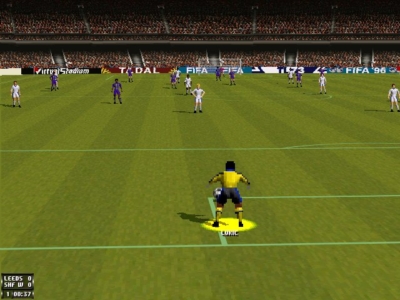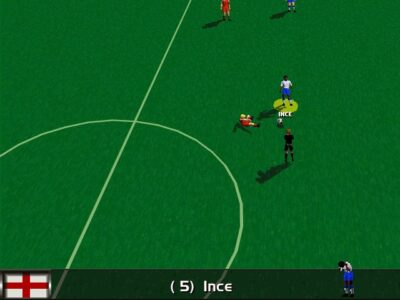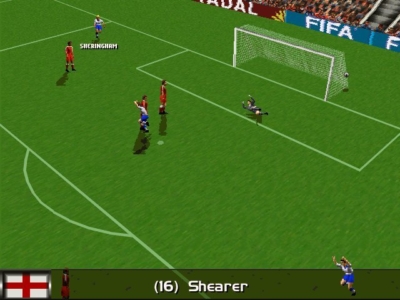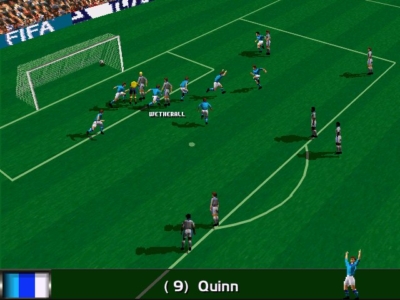
FIFA 96
Written by: Rik
Date posted: July 30, 2012
- Genre: Sport
- Developed by: Electronic Arts
- Published by: Electronic Arts
- Year released: 1995
- Our score: 5
Difficult as it may be to believe, there was once a time when EA didn’t release a FIFA game every year. Actually, no, that isn’t strictly true: the success of the original on the Megadrive meant that they did release a follow-up, FIFA 95, but we didn’t get that on the PC, because we only got the first FIFA a year after everyone else, in 1994, by which time FIFA 95 (because you always release your game in the year before the one you put on the box) was already on its way to consoles.
To further confuse the issue, 1994 also saw the release of another version of FIFA, on the 3DO, which distinguished itself from the other home versions by boasting a completely new fab-whizzo 3D engine, a video intro, and commentary from John Motson. Seeing as this failed to send consumers reaching for their wallets to install the ill-fated multiplayer in their homes, EA later cut their losses and re-hashed this version for other formats (much as they had with a couple of their other 3DO titles, Road Rash and The Need for Speed) – renaming this PC version FIFA 96.
Casting the cynicism of the first paragraph aside, FIFA 96 arguably represents the last time gamers saw any kind of technological innovation in the series. These days, we’re used to evolution rather than revolution, and however charitably you feel towards this method of developing football titles, it’d still be a stretch to try and identify the last thing that was truly amazing about any of the FIFA titles. Consolidating superiority (at the time of writing) over Konami’s PES series has taken a number of years, and it’s been a gradual process, rather than the balance of power shifting at one particular point in time.
Back in the mid-90s, though, you could expect a football franchise to be completely transformed from one year to the next. Upon release, FIFA had been impressive, yes, but FIFA 96 has even more: a long video intro; slicky-produced dance/rock backing music; high-res menus; and real players, club teams and tournaments (a significant improvement upon the original’s meagre offerings). Modern FIFA, it could be argued, was born here.
The improvements aren’t just limited to the off-pitch superficialities, though. While in places, the action closely resembles that of its predecessor – the player animations giving the impression of men running on the spot; the odd split-second moments when you don’t feel in control of anything; and goalkeepers that seem able to save shots from yards away more easily than an effort from the halfway line – in reality, it’s a game transformed.
You can actually pass the ball around, for one thing. Your team can play a short passing game, or hoof it long; build play up the middle or attack down the wings. Whatever – it resembles a game of real football, and you largely feel in control of proceedings. The previous game’s two-button control scheme has been increased to three, allowing you to perform a short pass, chip, or shot with a single press. On the defensive side, two different strengths of tackle allow you to either lunge for the ball half-heartedly or go in full-blooded with two feet. It’s an altogether more playable experience than last time around, although some gripes remain: holding down any one of the three main control buttons to run either commits you to whatever action that represents once you let go, for example, and it has to be said that shooting is rather hit-and-miss when compared with the slightly more sure-fire tactic of pumping crosses into the box.
Things are altogether more clunky when using the keyboard rather than a joypad (tough luck if DOSBox doesn’t recognise your pad) – because the game doesn’t like you holding down too many buttons at once, you’ll have a hard time pulling off a diagonal shot – and once again, the difference between arcade and simulation modes is anybody’s guess (like last time, the only disparity I could detect involved the severity of punishment for tackling being harsher in simulation mode). But, all things considered, this still plays a pretty decent game of football.

John Lukic, about to take a goal kick (p.s. John Lukic is the worst goalkeeper in the history of football, ever).
On the presentation side, while things have (obviously) dated somewhat, the graphics stand up well, and the decision to use a mixture of sprites (for players) and polygons (for the stadium) seems to have helped in this regard, although it drew some criticism at the time. Crowd sounds are once again excellent, and the commentary from one-time “voice of football” John Motson is effective. Sadly, I didn’t have access to the commentary for my review of the last game, but I had a feeling somewhere that the simplicity of its construction meant it stood up well against modern counterparts that still don’t seem to have nailed this feature. Even if that feeling was based on a faulty memory, the Motson commentary here certainly seems to bear out the theory that simplicity in pre-recorded commentary does a game more favours than ham-fisted attempts to script more detailed analysis and “banter” between commentators and pundits. Here, Motson is on his own, keeping his input to the name of the player with the ball, what he is doing, and what is happening on the pitch, keeping stilted and cringe-worthy observations to a minimum.
Of all the FIFA games, I always felt FIFA 96 got the rawest deal from critics, particularly in the UK, where the press seemed keen to push the claims of home-developed rival Actua Soccer (known as VR Soccer elsewhere, and on GOG.com, where you can still buy it). Indeed, developers Gremlin commissioned a fairly high-profile print campaign at the time, highlighting that their game had secured the critical high-ground, furnishing the ad with favourable quotes and review scores of the two games for comparison.
To be fair, EA did themselves no favours by pushing the “Virtual Stadium” angle in their own press, when this technology amounted to little more than a 3D environment, which Actua not only matched, but beat, by virtue of also boasting 3D players rather than sprites. Without wanting to go into details, though, Actua Soccer was a dog of a game, and whatever you might say about EA taking liberties by releasing more than one football title in a calendar year, it’s worth pointing out that Actua was swiftly followed by a tournament tie-in, Euro 96, and then by Actua Soccer: Club Edition, both of which only offered cosmetic improvement while failing to address any of the major flaws exhibited by the original.
Still, we’re talking about FIFA 96 here, and the conclusion we’ve reached is this: it represents a significant leap from the previous PC instalment, and it still offers a reasonably-playable game of simulated football. There are elements of clumsiness, both in the gameplay (as identified above) and in the presentation (why, oh, why does every match have to include blurry full-time footage of World Cup ’94 highlights?) but, all-in-all, it remains a solid effort. This was perhaps the last time FIFA surprised and impressed the gaming public, and if you have fond memories of that, a quick blast isn’t going to disappoint. For everyone else, well, if you don’t like old football games then what the hell are you doing here?
(Sorry, didn’t mean to be rude).





 Posts
Posts